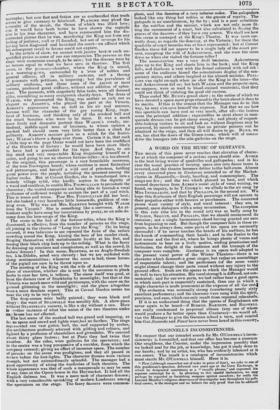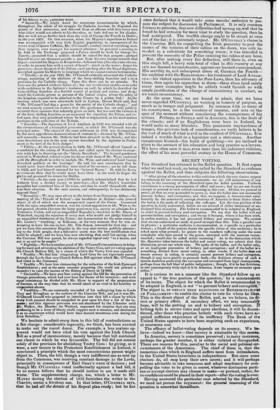O'CONNELL'S INCONSISTENCIES.
supreme contempt for it. In adverting to this candid declaration, we may of his fidelity to airy particular tenet. " Secondly—We might detail the numerous inconsistenciee by which, throughout the whole of his struggle for Catholic freedom, he disgusted the gentry of that persuasion, and deterred froin ari alliance with him every man who either would not aubmit to his dictation, or bade defiance to 'his slander.
But we will not go further back than the visit of George the Fourth to Dublin, in the year 1821. On that occasion, when his Majesty's expedition to Ireland
was accompanied with very little English popularity, in consequence of the recent trial of Queen Cafoline, Mr. O'Counelts conduct excited something more than surprise, even amongst his warmest admirers : be procured a meeting to be held at the Exchange proposed a Palace Amalfi be built for George the Fourth—promised that a million should be raised for that purpose—pledged himself to give one thousand pounds a year from his own income towards that
object—escorted his Majesty to Kingstown—followed him (literally) into the aea, in order to present him with a crown id laurel l—knelt in the water—forgot his promises—never dreamed of the Palace—and not long after the Royal departure, inveighed against his Majesty in language which we cannot venture to transcribe. " 'thirdly—in the year 1825, Mr. O'Connell evidently advocated the Catholic wings, consisting of the abolition of the forty-shilling franchise and a state
provision fur the Catholic clergy. Upon this there can lie no mistake. We have not the printed evidence before us ; but our recollection enables us to refer with confidence to the Agitator's testimony on oath, by which be described the .thrty-shilling franchise as a fruitful source of perjury and crime ; and desig- nated the Catholic priests as persons of the lowest origin, whom the safety of
the kingdom required to be attached to the Crown by a golden link ! At.the meeting which was soon afterwards held in carlow, Doctor Doyle said, that
4' Mr. O'Connell had dug a grave for the purity of the Catholic clergy; " and we need scarcely remind our readers that this gentleman has not only publicly recanted these opinions thus solemnly given on oath, but has used the extmetien
of the forty shilling franchise as an argument for repealing the Union, and re- lied upon that very. priesthood whom he had so stigmatized, as his most zealous partisans in the collection of the Tribute.
" Fourthly—The departure of Lo:d Anglesea in 1828 was attended with all the circumstances of a triumphal procession, in which Mr. O'Connell was the principal actor. The return of the same nobleman in 1831 was distinguished by the most opprobrious demonstrations of conturnely—dictated by Mr. O'Con- nellavowedly—because Mr. Doherty had been elevated to the Bench ; and this same functionary was in the next session described by the Agitator in Parlia- merit as the best of the Irish Judges!
" Fifthly—At the general election in 1830, Mr. O'Connell offered himself as a candidate for the county of Waterford, and called -upon the electors to coope-
rate with him in throwing out the bloody Beresfords.' The learned gentleman arrived in Waterford, refused tojoin his forces with those of Mr. Wyse, coalesced with Me Beresfords in order to exclude Mr. Wyse, and embraced Lord George
Beresford publicly on the hustings ! He told hie new constituents that be would never leave them until they were tired of his services ; yet he left them in 1832, and had himself returned for lds 'beloved Kerry.' He told his Kerry stristituents then that he would never leave them : in one week he forgot the ple17,e and procured his return for Dublin.
"Sixthly—In the same year (1830) he publicly acknowledged that he had hitherto been a decided enemy to poor-laws—that Dr. Doyde's irresistible pamphlet had convinced him of his error, and that he would thenceforth advo- cate their adoption. Iu the next session, and subsequently, he has obstinately Opposed them ! " Stiventli1Y—We may next advert to the letters from Darrynane Abbey—the meeting of the 'Friends of Ireland '—the breakfasts at Holmes'--the avowid ohject of all of which was the unequivocal repeal of the Union. Connected with the same unqualified avowal, was his violent opposition to Mr. Wyse at the last general election (because the latter gentleman was merely an advocate for a Federative Union, and not an unqualified Repealer)—his letter to Mr. Hayes, of Waterford, urging the rejection of every man who would not pledge himself to an unqualified dissolution of the Union--his denunciation for the same reason of Mr. Leader's truckling,' at Kilkenny, at the very moment that he was at- tempting to have his son-in-law, Mr. Fitz-Simon, returned for that city : and _yet we have this consistent Repealer in the very next session publicly announc- ing to the Irish people, that a federative union was the best modification that could be adopted ; and we have him now admitting that until last spring, when the 'Coercion Bill was passed, he always regarded repeal only "as a means, and not as an end to be sought." " Eighthly—We have another proof of Mr. O'Connell's inconsistency in bring. ing forward and advocating the abolition of the Vestry Cess, and yet voting against the Church Reform Bill, by a clause of which the Vestry Cess was repealed, "Ninthly—We find him vituperating Lord Grey for not vigorously passing through the Lords that very Church Reform Bill against which Mr. O'Connell had voted in the Commons.
" Tenthly —We have him clamouring for the reduction of the Irish Episcopal Establishment ; and at the same moment proposing (he could not procure a seconder) to 'raise the income of the Bishop of Derry to 12 0001. " Eleventhly—We have seen him voting against the bill for the prevention of Orange processions, which had ever been the theme of his invective; and with equal consistency he divided with Mr. Shaw in support of the perpetuation of freemen, at the very time that he would admit of no rival in his hostility to corporation abuses.
" Tweifthly—We are constantly reminded of his unforgiving hate to Lords Grey and Brougham as the authors of the Coercion Bill; and yet it was Mr. O'Connell himself who proposed to introduce into that bill a clause by which every Irish peasant should be compelled to post upon his door a list of the in- mates ; and this rigorous provision was not abandoned by the Liberator until Mr. Walker, the Member for Wexford, expressed his surprise that any man professing to be a lover of liberty could eupport such a measure, and denounced it as an enactment which would have been deemed monstrous even during the Irish Rebellion."
We hesitate to admit every item in this bill of contradictions as a fair charge : considerable ingenuity, we think, has been exerted to make out the round dozen. For example, a less zealous op- ponent would not have cited his vote against the Irish Church Bill as a proof of inconsistency, merely because that bill contained one clause to which he was favourable. The bill did not consist solely of the provision for abolishineb Vestry Cess : by giving, as it were, a new tenure to the Protestant Establishment in Ireland, it sanctioned a principle which the most conscientious person might object to. Then, the bill, though a very indifferent one as sent up from the Commons, was receiving constant damage in the Lords, principally in consequence of Earl GREY'S want of decision ; and though Mr. O'CONNELL voted ineffectually against a bad bill, it by no means follows that he should incline to see it made still worse.' The supplementary charge, too, which a letter to Mr. HAYES during the election of 1832 furnishes the writer in the Courier, seems a frivolous one. In that letter, O'CoNNELL says, that he had all the details of his Repeal plan ready; but he has since declared that it would take some months' seclusion to pre- pare the subject for discussion in Parliament: It is only common fairness to presume, that new difficulties had Sprung up,end that he found he had occasion for more thee to study the question; than he had anticipated. The twelfth charge might to be struck at once out of the list ; it is extremely unjust. Mr. O'Coresetes clause in the Coercion Bill, for compelling the Irish .peasantry to post the names of the inmates of their cabins on the doors, was only in- tended as a substitute for something worse ; it was intended to prevent the necessity of the Police entering the cabins at any hour. But, after making every fair deduction, still there is, even on this single bill, a heavy sum-total of what in this country at any rate are deemed inconsistencies, against our learned correspondent. His servility to, and subsequent abuse of, GEORGE the Fourth— his coalition with theBERESFORDS—his treatment of Lord ANGLE- SEA—his violent opposition to the Poor-Laws, then his advocacy of them, then again his opposition to them—these alone (and surely many more examples might be added) would furnish us with ample justification of the charge of inconsistency in conduct, as we count inconsistency. At the same time, we are bound to admit, that we have never regarded O'CONNELL as wanting in honesty of purpose, so much as in temper and judgment. In common with so many of his countrymen, he is the creature of impulse, and acts on the spur of the moment without considering the consequences of his actions. Perhaps, as STEELE said to ADDISON, this is the fault of the climate; and if an Englishman were born in Ireland, he would make as many blunders. This passionate waywardness of temper, this grievous lack of consideration, we verily believe to be the root of much of what is evil in the conduct of O'CONNELL. his indeed a terrible fault in a legislator and a statesman. Another conspicuous blemish—his habit of quibbling—we are inclined to place to the account of his education and long practice as a lawyer. We have often seen it mar, even more than his indiscreet violence, the effect of his most powerful oratory in the House of Commons.



















 Previous page
Previous page